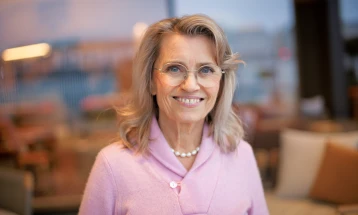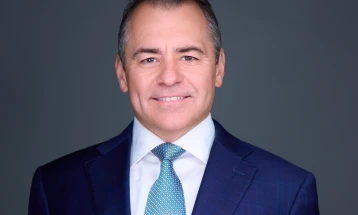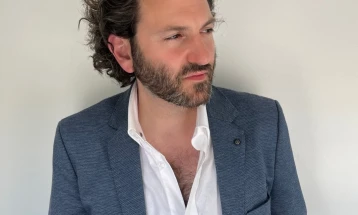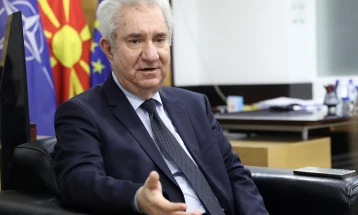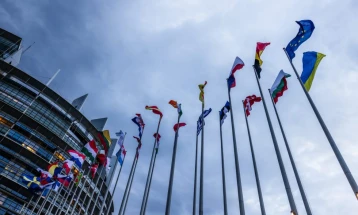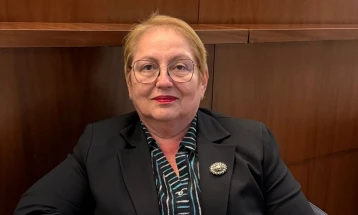Bilateral issues tend to go into distance as country advances on EU path, focus on reforms, Geer tells MIA
- My personal view, and I think it’s very much the view from Brussels, is that this deal you reached with Bulgaria was the best deal that could be achieved in the circumstances, says European Union Ambassador David Geer in an interview with MIA.
- Post By Ivan Kolekevski
- 10:53, 15 July, 2023
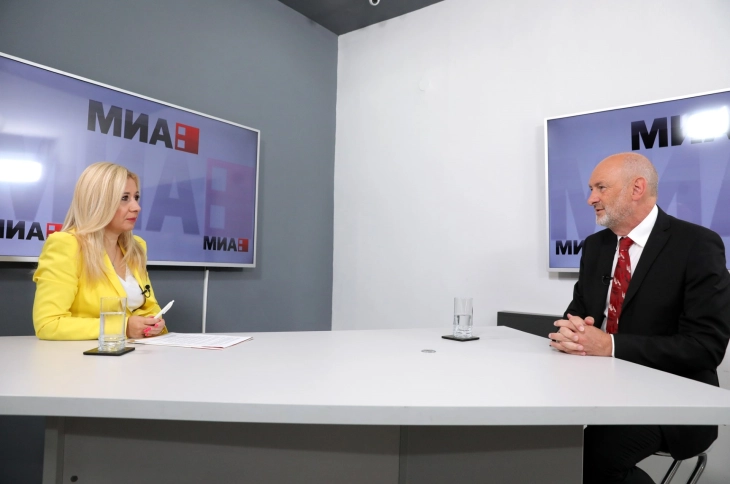
Skopje, 15 July 2023 (MIA) - My personal view, and I think it’s very much the view from Brussels, is that this deal you reached with Bulgaria was the best deal that could be achieved in the circumstances, says European Union Ambassador David Geer in an interview with MIA.
"I have to say I followed the discussions that took place from October 2020 until July 2022 when agreement was reached. And, I have to say, I followed it very closely and it was an extremely difficult discussion with many different demands, some of which were abandoned, but a very difficult discussion," says Ambassador Geer.
Asked if a better negotiating framework is possible, along with guarantees from the Union itself that there will be no more blocades on the European path by Sofia, the EU Ambassador says the agreement is a compromise, and a compromise means that no one is completely happy.
"The agreement allowed this country to put behind it the problems of the past and to move forward focusing on what it should really be focusing on, which is the different reforms, which is the fast-track to the European Union, the faster you implement reforms the faster you will join the European Union," says Geer.
On the possible failure of the constitutional amendments, Geer says the EU will not disappear but the practical consequences of not moving forward would be that its path to the European Union would be delayed.
Below is the full interview and video:

Ambassador Geer, next week marks one year since the holding of the first intergovernmental conference with the EU. Will the country wait for another 17 years for the next step and the opening of the clusters?
You are right. The country has waited a long time, too long. But last year, in July, an agreement was reached, which provided an opportunity for the country to move forward decisively on its European path, through the opening of accession negotiations. What happened immediately after – the agreement was reached here, there was an Intergovernmental Conference in Brussels, and shortly afterwards, what we call the next step in the process, was the screening process was launched and is progressing very well. So, a door has been opened and the way is clear, and the way forward is clear for the country. The issue is that to get to the next step, which would be finishing the screening process and then a second IGC, in which we would work together to identify the roadmaps, the benchmarks for opening of what we call the clusters is dependent on the country making amendments to the Constitution to include people who self-identify as Bulgarian, within the protections of the Constitution. And just to explain where that comes from: it comes from a bilateral agreement reached between North Macedonia and Bulgaria, agreed at the same time last July, which then made it possible to move forward and, as I said, be able to progress decisively towards the European Union.

The screening process is ongoing, it should be completed in November. Constitutional amendments need to be made for the country to continue with the opening of the clusters. In the meantime, the opposition party VMRO-DPMNE has suspended all communication with the government, citing non-respect of their demands as a reason. In your view, what is the way out of this situation, towards finding a compromise for changes in the Constitution?
These are two separate issues here. First of all, the question is how does the country move forward. The answer to that question does not apply only to the constitutional changes, it applies to every single step of the way, and that is through dialogue. We have witnessed in this country very high polarization between the political parties. Almost all political parties state publicly and repeatedly that they are committed to the European Union path. And yet, when it comes down to practical cooperation, let’s say on legislation, which would advance the country and also be valuable for citizens, we’re not seeing that cooperation. So what needs to change is a spirit of dialogue and a spirit of cooperation between the parties in order to move forward. And we’ve seen this in other countries, take Croatia, which moved forward quite rapidly on its accession path, because although there were very big differences between the parties, between government and opposition, they came together and agreed that on the European reform agenda they would work together. That is absolutely essential and the key to the constitutional changes and the key to moving forward and joining the European Union is consensus across the political divide.
Now, turning to the Constitution itself. Of course, this is a sovereign decision for the country to make, and yesterday we had three foreign ministers here – from Austria, Czechia and Slovakia – who were making the same points: this is a sovereign choice for the country to make. But I think it’s important when looking at the constitutional changes and when they are published, we are still waiting to see the final text, that the debate that takes place is in an open manner and that all politicians act responsibly, putting the national interest first, to look at the text first of all to see what is actually being proposed. If, as we expect, it is indeed to include people who self-identify as Bulgarian within the Constitution, this would in a way make it explicit what is already implicit within the Constitution, and would further strengthen this country’s already good record of interethnic relations. I would not see it as against the national interest or threatening the identity of this country. But these are decisions for the country to make.
The other element I would just add to this debate I think that it’s important to look at the big geopolitical picture. The ministers yesterday were trying to paint this picture to show that what we are seeing now in Europe, in this extraordinary time of Russia’s war against Ukraine, is a new momentum, a new urgency, a new understanding of the mutual interest of advancing rapidly on enlargement for Ukraine, for Moldova, but also for the Western Balkans. So, the door is open for moving forward for this country but in order to go to the next step, the constitutional changes will need to be made. If they are made, then the next step would happen automatically, with no possibility of veto and no further decision taken.

What if the constitutional amendments are not adopted, what happens with North Macedonia and its relations with the EU?
First of all, for the EU, it’s not going to disappear. We will still be here, we will still engage with this country, we will still provide assistance. We are committed to this country’s European path and we want you in the European Union. But the practical consequences of not moving forward with the constitutional change would be that its path to the European Union would be delayed. This was the point that the ministers were making yesterday. That’s just a statement of fact – it would be delayed and other countries who are negotiating might move forward. Again, a statement of fact, we don’t want that situation to arise but ultimately, that’s a decision for politicians here to make looking at how they see the national interest and how they see the goal of joining the European Union as soon as possible.

In your opinion, is the growing Euroscepticism in the country due to the many concessions that were made in the name of the EU or, perhaps, due to the situation in the Union itself, given the deepening divide with Poland and Hungary, on the one hand, the southern (debtor) states on the other, and then the northern parts of the Union.
To start with the European Union itself and when you’re looking at our measurement of public opinion, the Eurobarometer what it is showing within the European Union the skepticism of the European Union is at its lowest for a very long time. The European Union has been dealing with some enormous issues – climate change and the consequences across Europe and the need to reindustrialize, to rethink our whole basis of our economies in the light of the need to address climate change. We had the whole Covid crisis, we now have what we had never imagined possible, which was a war in Europe conducted by Russia against Ukraine. These are huge challenges, and what has the European Union done is worked with unity and managed to come together on all of these issues to overcome difficulties. Of course there are differences, but that’s the nature of a body such as the European Union consisting of 27 member states, where there will be differences and differences are useful because it means you have a deeper and more nuanced debate and you take into account and have a bigger perspective. So I think that that is natural.
Now, coming back to North Macedonia, I was interested in the recent latest polling which put, depends a bit on what you’re asking the question, but looking at I think support for European integration, we see the figures are in the high 70s. So there’s a consistent desire and wish by the people in this country to join the European Union. I think where there is uncertainty and more skepticism is indeed because of the long delays, then citizens are asking well, you know, how long will it take, will it really happen, what do we need to do. And of course it’s for us, I think working together with you, to show that indeed the path to the European Union is not that complex. It is difficult, it requires a lot of reforms, but these are in the interest of the citizens as well, but at the end of the day, it is achievable, practical and realizable within a very reasonable timeframe if the political commitment is there to move through the different reform steps.

You recently opened the fifth Europe House in Veles, following those in Skopje, Kriva Palanka, Strumica and Bitola. The focus is on young people, does this mean that the EU is slowly changing its approach and turning directly to the citizens?
And we’ll be opening Europe Houses also in Struga and Tetovo, I hope by the end of the year. So indeed, a big expansion of our Europe House network. Europe House is really meant to be a place first and foremost that brings young people together to talk about issues that are important to them and also the European Union future of the country, although they also talk about the EU more generally. I would just slightly disagree with you because I think we have always tried to reach out to citizens directly and it’s one of the great joys. Perhaps the thing I most enjoy about this job is getting out and meeting people and listening to what they have to say. We try to do that across the country in all towns, villages over time and, as we do with our assistance which is very widespread. But indeed, we see young people as really important mass of talent and also future potential for the country. What we don’t want to see is this continuing trend of young people leaving the country because they believe, for different reasons, that they cannot have a life here. So Europe Houses, our commitment to young people which also takes other forms such as our big Erasmus programme, the support that we give to help young people who are faced with unemployment or who are not sufficiently skilled, through our Youth Guarantees, other schemes, all of these are designed to make young people active and engaged, and to really build them up not as citizens of the future but citizens of now and having a part in deciding the future of this country, and hopefully, also deciding as future citizens of the European Union.

In the debate on the constitutional amendments, a better negotiating framework is often mentioned to be possible, as well as guarantees from the Union itself that there will be no more blocades on the European path by Sofia. Which of these is possible?
Let’s start with a better deal. I have to say I followed the discussions that took place from October 2020 until July 2022 when agreement was reached. And, I have to say, I followed it very closely and it was an extremely difficult discussion with many different demands, some of which were abandoned, but a very difficult discussion. My personal view, and I think it’s very much the view from Brussels, is that this deal was the best deal that could be achieved in the circumstances. It’s a compromise, a compromise means that no one is completely happy. But, as I said at the beginning of this interview, what it did do was it allowed this country to put behind it the problems of the past and to move forward focusing on what it should really be focusing on, which is the different reforms, which is the fast-track to the European Union, the faster you implement reforms the faster you will join the European Union.
On the second question of guarantees, and it is a legitimate question which people often ask, how can you guarantee that there will not be a block in the future. First of all, you can’t guarantee that there will not be a block in the future, but it’s our job to make sure that if there are blocks in the future they’re there because this country has not moved forward on the rule of law, that the environmental legislation has not been implemented, that the fight against corruption has not been sufficient. In other words, that we are focused not on bilateral issues but focused on those critical reform elements which are necessary for this country to join the European Union. We have a responsibility there. What I would also say is the experience of other countries and the ministers yesterday of Austria, Czechia, and Slovakia were making the same point, it’s the experience of other countries that in the negotiating process there may be bilateral issues coming up quite prominently at the beginning, but over time, as you advance on your European path, this tends to go into the distance, and the focus is where it should be, which is indeed on these reform elements.
You announced that the European Union is to deploy peer review mission of the Judicial Council, when can it be expected to arrive, what will it do and what about the findings and possible recommendations that the mission will make? Do you expect this to make things better and put judiciary reforms on the right track?
We’ve all been following very closely what’s been happening in the Judicial Council in the past few months. Some have been very outspoken, we have been outspoken, we’ve been very concerned. We’ve said, Judicial Council what’s its job? Its job is to protect the independence, professionalism and integrity of judges, and some of the events that have been happening in the Judicial Council suggest it is not able to do that. So, as a signal of our concern, because this body is really at the center of the rule of law, we decided to send a peer review mission. What that means is literally sending people of the same standing, so judges, people who have been part of the judicial councils in different EU member states, to come over to look at what the situation is, to review the legislation, see if there are any weaknesses in the legislation on issues like transparency, criminal responsibility, to meet with everyone concerned to see how this is implemented, and then as a result of that, make recommendations which should help to strengthen the council do its proper job, which, as I say, is protecting the independence, integrity and professionalism of judges. Whether it will succeed does not depend on the European Union, it does not depend on the peer review mission. You can have the best peer review mission in the world coming here, making excellent recommendations. It will depend on political will in the Government, political will among the judges, political will among all of the parties, in order to ensure that they allow the judiciary to do its job.

Spain took over the EU’s rotating Presidency, but the enlargement is not directly stated under Madrid's four priorities. What can we and the region as a whole expect in the next six months? Will there be any movement in the enlargement process?
Spain announced its priorities and it put up four priorities, thematic priorities, it deliberately did not set up geographical priorities, very big issues such as the reindustrialization of Europe, issues around European unity, these are big ticket items, but there’s another document and commitment which I think is perhaps even more important because it’s much more long lasting and that was an agreement between Spain, as the current presidency, the next presidency, Belgium, and the presidency after that, Hungary, so an agreement covering 18 months where they set out their priorities, and in those priorities is enlargement and it’s very much a commitment to see the enlargement process move forward on the basis of merit and the implementation of reforms. So it is there, it is a top priority for not just Spain but for the three presidencies to come in the next 18 months.
European Commission President Ursula von der Leyen outlined a new 4-pillar plan to bring the Western Balkans closer to the EU, announcing it as a new growth plan for the region. How much will this speed up the Western Balkans’ EU integration, what is the benefit for the countries in the region?
Yes, there are a couple of things here. First of all, I think the Commission has been listening carefully to partners here who say ‘We want to join the European Union, we can see the economic benefits of joining.’ You know, for the average citizen in the EU, just membership of the single market, the 450 million people in that, that’s worth about 840 euros a year, just that. There are many other benefits. So, what governments and partners have been saying here is that we want to be a part of that, but what’s difficult for us is the process is quite long and we are not seeing the benefits arising sufficiently beforehand. You can argue about that because there is certainly foreign direct investment coming into the country as you get closer to the EU, but the Commission listened to that and had another question which is this – that for those countries join the EU it’s clear that their economy has to improve significantly in order for them to be competitive in what is a very competitive environment.
For example, in this country, the average income is only 41.5 percent of the 27 member states, and productivity for workers is about 16 percent of the EU average. So, clearly there needs to be a stimulus there. The ideas put forward by President von der Leyen, which are still being developed and discussed, is to see if there are areas where they can anticipate this kind of convergence, particularly in regards to the single market so that the county can start go get the benefits of membership, before it actually joins the EU itself. So, in other words it can start to feel that benefit earlier on. This is not about a different kind of membership or two-speed, or three-speed memberships, the idea is that you would become a full member of the EU, just that on your way if you are making that progress then that could be what we call an accelerated integration which would bring early benefits.
France's new methodology for the EU accession talks was to speed up the accession process. Is that the case now as well?
I think the new methodology does a couple of things. It talks about this idea of accelerated integration, which I just described to you as one example of that, is still the case and that is part of it. But it is also trying to make the process more deep and effective to ensure that as you come closer to the EU so you’re really prepared for membership. It’s important to understand that there are two big reasons why that is essential. Obviously from EU’s point of view, we don’t want a country that is unprepared to join the EU, we don’t want them import problems into the EU or instability. But also, for you equally important, you don’t want to go into a very competitive environment where you’re not prepared and might be weakened by competition, or you can’t really get the benefits of joining EU because you are not prepared. Therefore, it is in the interest of both sides to see a thorough preparation, and the new methodology is designed to help that, and to help make that possible.

The enlargement is becoming a security issue. Global security is threatened by the war in Ukraine, and the region sees renewed tensions between Belgrade and Pristina. Could leaving the region outside the EU cause new political and security issues in the Balkans?
We used to say NATO is about security, guaranteeing security, the EU is guaranteeing prosperity. Although that is true, we can say now that the EU is not only about prosperity, it is also about security, stability, and of course as is always has been, democratic values. So what you are seeing here, I think, is an understanding that part of the value of the enlargement process is to bring greater security and stability to the region, that’s in the EU’s interest. We are aware of that now more than ever, not least because of the war in Ukraine, and also because the EU as an actor in the area of security and ensuring stability has increased the tools available to it and has become more prominent and that’s a process that we will continue in the future. So yes, the answer to your question is this – that by joining the EU, by coming closer to the EU, I think those countries will enjoy greater stability and security in addition to prosperity and democratic base which I think we are all akin to see realized as soon as possible.
Neda Dimova Prokikj
Photo: Frosina Naskovikj
Video: Aslan Visko

